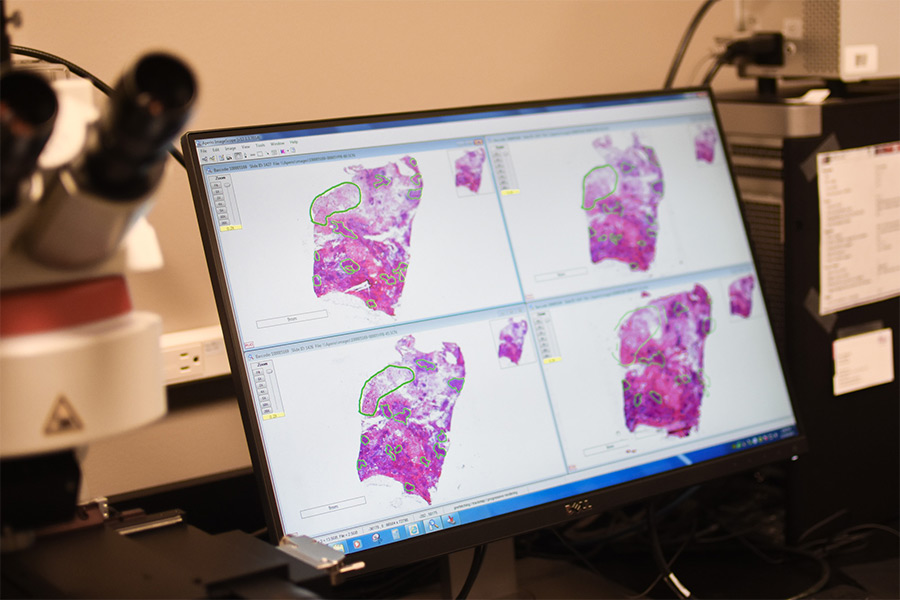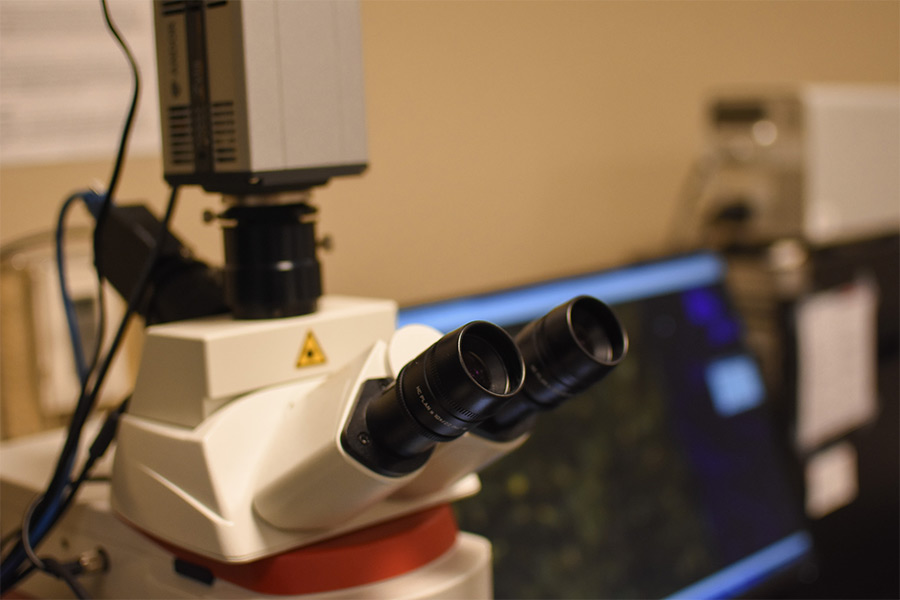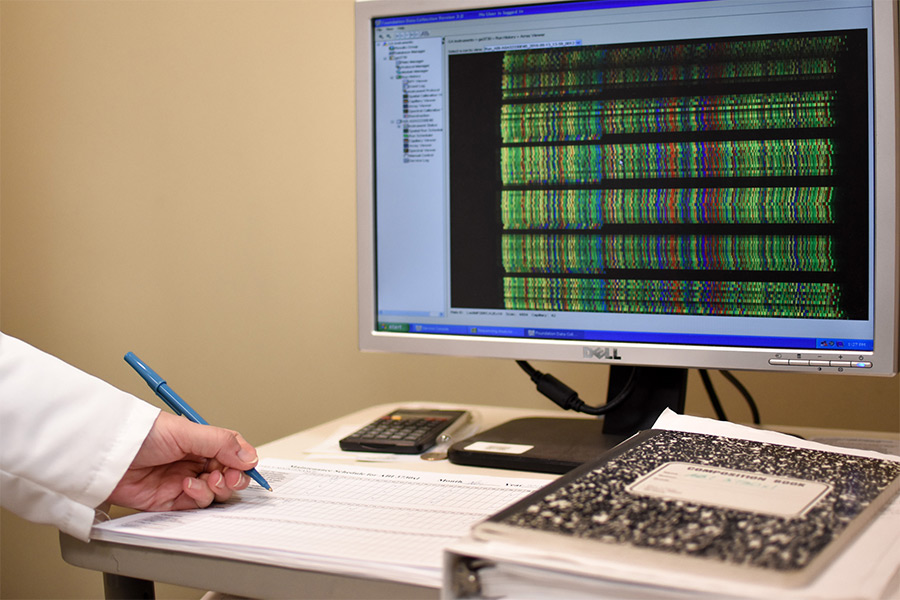Research at the Chan Soon-Shiong Institute of Molecular Medicine at Windber focuses on human cancer studies, addressing clinically- and scientifically-important problems with priority given to military-relevant questions. We emphasize team science and supplement it with individual scientist-led research.
The institute was established in 2000, and served as the research arm and biorepository for the DoD funded Clinical Breast Care Project (CBCP). Currently, the research focus of the institute has expanded to include pan-cancer studies and the institute’s scientists participate in major cancer research consortiums of The Cancer Genome Atlas project (TCGA), Applied Proteogenomics OrganizationaL Learning and Outcomes (APOLLO), and the Oncology Research Information Exchange Network (ORIEN). Previous DoD funded research projects include the Integrated Cardiac Health Project from 2003-2016, and the Gynecologic Disease Program from 2010 – 2011. Important institutional collaborators include Thomas Jefferson University, which resulted in the award of a Susan G. Komen for the Cure Promise Grant for therapy-relevant breast cancer patient stratifications (2010-2015).
For most of the major research programs, we have been closely collaborating with USUHS. Up to March 2019, we have published 151 peer reviewed papers in leading journals such as Cell, Nature, Immunity, JAMA Oncology, Lancet Oncology, Breast Cancer Research and Treatment, Bioinformatics, Journal of Biomedical Informatics, and Biopreservation and Biobanking. We have also published one book, 13 book chapters, gave 51 oral presentations at conferences or as invited speeches, and presented numerous conference posters.
CBCP started in 2000 as a five pronged approach emphasizing breast cancer clinical care, risk reduction, biorepository, biomedical informatics including infrastructure and bioinformatics, and focused research including genomics, proteomics, and translational studies. The clinical arm of CBCP is spearheaded by Murtha Cancer Center Research Program (MCCRP) of the Uniformed Services University of Health Sciences for clinical care, patient enrollment, and biospecimen procurement. Other current participating clinical sites include the Anne Arundel Medical Center (Annapolis, MD), the Joyce Murtha Breast Care Center (Windber, PA), and Highlands Hospital (Connellsville, PA). Our institute serves as the research center for CBCP, responsible for biobanking, biomedical informatics infrastructure, bioinformatics, and focused research.
TCGA was initiated by the National Human Genome Research Institute and the National Cancer Institute of the National Institutes of Health. Three cancer types were analyzed as pilot studies from 2006 to 2009, followed by the launch of the full program to study another 30 cancer types. The study focuses on molecular profiling analysis of cancer tumors using 6 major experimental platforms including whole exome sequencing, SNP arrays, DNA methylation arrays, RNA-sequencing, miRNA-sequencing, and Reverse Phase Protein Arrays. As part of the CBCP program, our scientists participated in the TCGA breast cancer study as one Tissue Source Site and as part of the Breast Cancer Analysis Working Group (BCAWG) focusing on clinicopathologic data analysis and contributing to molecular data analysis. We co-authored three high-impact papers in Nature (2012), Cell (2014,), and JAMA Oncology (2017), with more details provided in the department of bioinformatics.
As data from 33 cancer types all became available from TCGA, PanCanAtlas studies started in mid-2015. Close to 30 AWGs were formed, grouped into three research themes including cell-of-origin patterns, oncogenic processes, and signaling pathways. Our bioinformatics scientists participated in multiple studies, leading the development the TCGA Clinical Data Resource paper published in Cell (2018), and co-authoring 4 other papers in pan-cancer immunome, aneuploidies, ubiquitin pathways, and DNA repair pathways published in Immunity (2018), Cancer Cell (2018), and Cell Reports (2018) respectively.
APOLLO is a tri-federal agency research program as part of the US government’s Cancer Moonshot initiative. It is a cancer research consortium with members composed of clinicians and scientists mainly from the Department of Defense (DoD), the National Cancer Institute (NCI), and the Department of Veterans Affairs (VA) of the United States spearheaded by the Murtha Cancer Center Research Program (MCCRP) of Uniformed Services University of Health Sciences located in Bethesda, MD. A total of 8,000 patients will be enrolled from over a dozen military and civilian medical centers with their cancer-related biospecimens procured following the most stringent protocol for comprehensive proteogenomic analyses. This is accompanied by high-quality clinicopathologic data including patient treatment and outcome information to enable integrated analysis to provide important and unique insights to cancer tumor and patient care that are not offered by any other large-scale cancer molecular studies. Our institute proudly participates in the study as an affiliation to MCCRP, participating in the study design, serving as the Biobank, providing informatics infrastructure support, and co-leading data analysis efforts.
The Oncology Research Information Exchange Network (ORIEN) is a unique research partnership among North America’s top cancer centers that recognize that collaboration and access to data are the keys to cancer discovery. Founded by the Moffitt Cancer Center in Florida and James Cancer Center of Ohio State University, ORIEN currently is composed of 19 consortium cancer centers nationwide. Our institute, serving as the biobank to MCCRP, participates in multiple working groups and activities of ORIEN. Our biobank works closely with the MCCRP leaders in selecting, processing, and shipping biospecimens to the ORIEN genomic study laboratory. Our informatics infrastructure team provides support for clinicopathologic data extraction, processing, and shipping. Our researchers collaborate with other cancer centers to make use of the data to answer clinical and scientific questions of common interest.
We recognize that traditional individual-scientist led research is a necessary supplement to major team science research. Such studies are performed both in the laboratory and using bioinformatics techniques, focusing on racial disparity, breast cancer in young women, benign disease studies, comparative survival analysis, and disease recurrence signatures, etc. Examples of such studies are described under the different departments of the institute.


